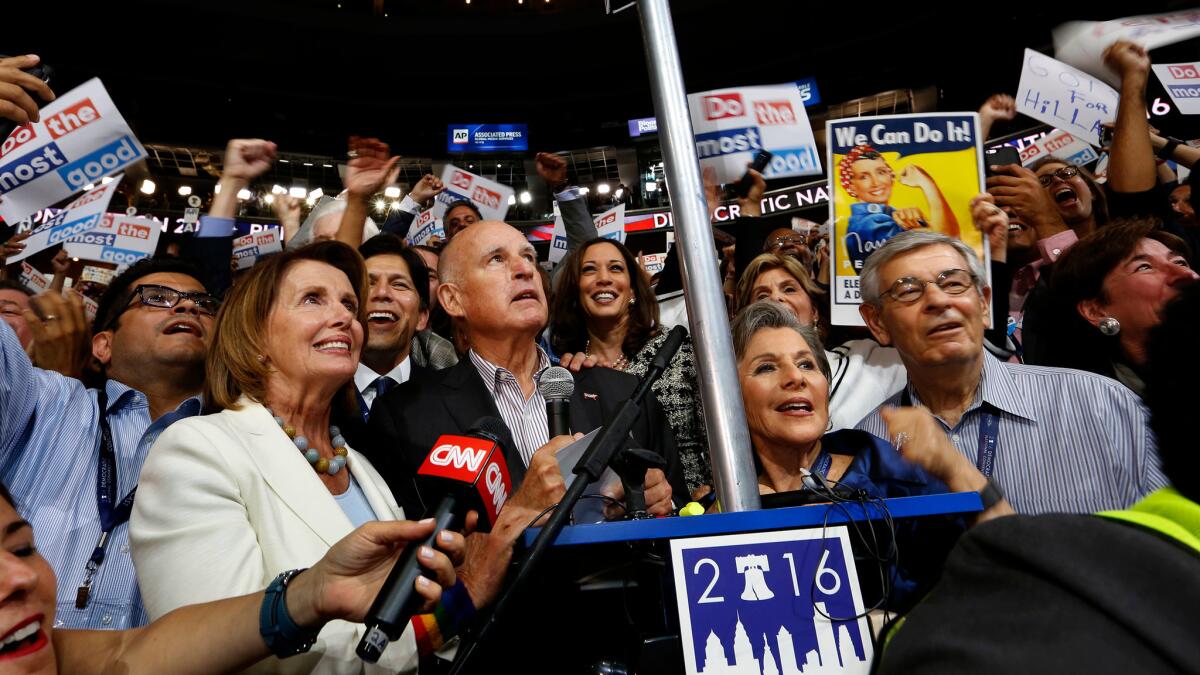These women got to Congress when their numbers were few. Here’s what Clinton’s historic nomination means to them

Reporting from Philadelphia — For the women in Congress who’ve known her the longest, Hillary Clinton’s acceptance of the presidential nomination will be recognition of the scrabbling they did together in the decades when female politicians were scarce.
The idea that the United States might elect a woman president for the first time hasn’t been omnipresent on the campaign trail. But it’s been there all along for the women in California’s delegation.
When many of them ran for Congress in 1992, there were 33 women in the House and two in the Senate. Now, there are 104 in the House and 20 in the Senate.
“We haven’t been able to focus on it, but … I think the realization will hit when she walks out on that stage,” Sen. Barbara Boxer said in an interview here on Tuesday.

Day Two of the Democratic National Convention in less than 3 minutes. Full coverage at latimes.com/trailguide
For House Minority Leader Nancy Pelosi, Clinton is the woman she met 35 years ago, a young mother cradling her infant daughter at a dinner party at the home of Hollywood activist Stanley Sheinbaum.
“I was expecting to meet this formidable, firm woman,” she said in an interview. “When the door opened ... there was Hillary Clinton off to the side holding Chelsea in her arms. There she was as a mom.”
A decade later, as she campaigned for her husband’s 1992 presidential run, Clinton worked to elect female candidates.
“She was so helpful to all of us,” Boxer said.
In that election, dubbed the “year of the woman,” Boxer was elected to the Senate. Sen. Dianne Feinstein won a special election, and women gained 22 seats in the House.
Feinstein got to know Clinton as first lady, and remembered how in 1993, the president’s wife surprised her with a cake in the private residence at the White House on her 60th birthday because she couldn’t be home with family in California.
When Clinton won the U.S. Senate seat in New York, Feinstein shared her office space until Clinton’s office was ready and mentored her on how to represent a big state.
“It’s easy to reach her, she’ll always return the call,” Feinstein said in an interview before the convention, adding that the two don’t have dinner together as often as she’d like. When they do, “we both enjoy a martini and a couple of jokes,” she said.
It was Feinstein who brokered and hosted a secret meeting to forge unity between Clinton and then-Sen. Barack Obama after he defeated her for the Democratic nomination in 2008.
Boxer, one of Clinton’s most visible advocates, was related to Clinton by marriage — her daughter, Nicole, married Clinton’s younger brother, Tony Rodham, in the White House Rose Garden in 1994. The two were divorced in 2001.
Clinton sought Boxer’s advice in 2008 on whether to become Obama’s secretary of State.
“I said, I don’t want to lose you from the Senate, but he needs you,” Boxer recalled.
Rep. Anna G. Eshoo knows Clinton as the woman who sent her mother flowers in the hospital and who traveled across the country to thank nuns in her Bay Area district for praying that Clinton would win a second Senate term in 2006.
The sisters still ask Eshoo at weekly Mass about Clinton and how the race is going.
“I said to the sisters, ‘God willing, if you pray hard enough, maybe she’ll come back to Oakwood as president of the United States,’” Eshoo said.
In quiet moments over the last few days, Eshoo, 73, has thought about watching political conventions as a child and a young woman interested in politics.
“I certainly didn’t know of any women. It just didn’t exist,” Eshoo said. “Here we are on the threshold of a woman accepting the nomination of a major political party. I feel blessed that in my lifetime I’ve gotten to experience it, because I didn’t dream that this would happen when I was much younger.”
Eshoo said she gets the sense from some young women that they don’t see why Clinton accepting the nomination is historic. Many young voters grew up with the expectation that women could do anything.
“I always say to constituents that we love our history once it’s been made, but we don’t have a sense of appreciation of making history,” Eshoo said.
The California members pointed to the hope they felt watching Geraldine Ferraro become the first female vice-presidential candidate for a major party ticket at the 1984 Democratic National Convention in San Francisco.
Seeing Clinton’s acceptance speech might mark a similar moment for a new generation, Pelosi said.
“When she accepts that nomination, it will be a moment in American history that will not be forgotten,” Pelosi said.
Follow @sarahdwire on Twitter
Read more about the 55 members of California’s delegation at latimes.com/politics
ALSO:
History takes the stage: Hillary Clinton becomes the first woman to lead a major-party ticket
Bill Clinton offers lavish testimonial for Hillary Clinton after her historic nomination
President Obama says it’s ‘possible’ Donald Trump could win
Black Lives Matter playing a prominent role at Democratic convention
Updates on California politics
More to Read
Get the L.A. Times Politics newsletter
Deeply reported insights into legislation, politics and policy from Sacramento, Washington and beyond. In your inbox three times per week.
You may occasionally receive promotional content from the Los Angeles Times.











